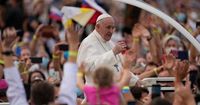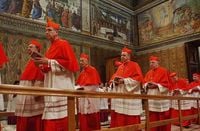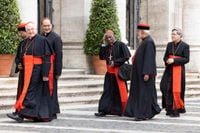The conclave to elect a new pope will commence on May 7, 2025, following the death of Pope Francis, who passed away at the age of 88 on Easter Monday, April 21, 2025. The Vatican confirmed the date after cardinals gathered for their first informal meetings post-funeral, which was attended by over 250,000 faithful in St. Peter's Square. This conclave marks a significant moment for the Catholic Church, as it will determine the successor to a pontiff who championed a pastoral approach towards marginalized communities and social justice.
Pope Francis's funeral took place on April 28, 2025, and he was laid to rest in the Basilica of Santa Maria la Mayor. The cardinals have chosen to delay the start of the conclave by two days, allowing them more time to engage in discussions about the Church's future and to build consensus around a candidate. The decision to begin the conclave on May 7, rather than the initial possible date of May 6, reflects a desire among the cardinals to deepen their conversations.
Cardinal Baltazar Enrique Porras Cardozo expressed optimism that once the conclave begins, the decision could be reached relatively quickly, potentially within two to three days. However, the dynamics within the College of Cardinals are complex, with varying perspectives on the direction the Church should take moving forward. While many cardinals wish to continue Francis's focus on social issues, there is a conservative faction that seeks to return to the fundamental doctrines emphasized by previous popes, such as John Paul II and Benedict XVI.
As of now, there are 135 cardinals eligible to vote in the conclave, with 108 of them appointed by Pope Francis himself. The cardinal electors will gather in the Sistine Chapel, a historic venue for papal elections, where they will conduct their voting process under strict confidentiality. Once the conclave begins, the cardinals will not be allowed to communicate with the outside world until a new pope is elected.
The voting process is meticulously structured. Each day, the cardinals will cast their votes, and a two-thirds majority is required to elect a new pope. If a decision is not reached within three days, the cardinals may take a day for prayer before continuing with the voting. The outcome of each vote is signaled by the color of the smoke that rises from the chapel's chimney: black smoke indicates no decision has been made, while white smoke signifies the election of a new pope.
The last conclave, which elected Pope Francis in 2013, was completed after only five rounds of voting, making it one of the quickest in modern history. However, the current conclave is anticipated to be more prolonged, given the diverse backgrounds of the cardinals and the internal divisions that have emerged during Francis's papacy. This conclave is notable for being the most international in history, with representatives from 71 countries.
Cardinal Giovanni Angelo Becciu's situation adds another layer of intrigue to the upcoming conclave. Once a powerful figure within the Vatican, Becciu was stripped of his rights as a cardinal in 2020 following allegations of financial misconduct. While he has stated that he believes he has the right to participate in the conclave, the Vatican's official stance classifies him as a non-elector, and the cardinals have yet to resolve this issue.
As the cardinals prepare for the conclave, they are also reflecting on the qualities needed in the next pope to address the challenges facing the Church today. Discussions have included topics such as the Church's relationship with contemporary society, evangelization efforts, interfaith relations, and addressing past abuses. These conversations are crucial as they will shape the profile of the candidate who ultimately receives the necessary votes to become the next leader of the Catholic Church.
In the lead-up to the conclave, the cardinals will gather for a mass, led by the dean of the College of Cardinals, to invoke the Holy Spirit's guidance in their decision. Following this, they will enter the Sistine Chapel, where the conclave will officially begin.
Once a new pope is elected, he will be asked if he accepts the position and what name he wishes to adopt. The announcement of the new pope will be made from the central balcony of St. Peter's Basilica, a moment eagerly awaited by millions of Catholics worldwide.
The conclave represents not just a pivotal moment for the Catholic Church but also a reflection of the broader societal issues at play. As the cardinals engage in their deliberations, the world will be watching closely, eager to see what direction the Church will take under its new leader.



